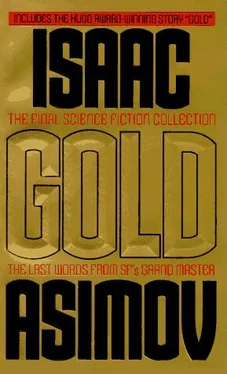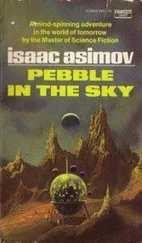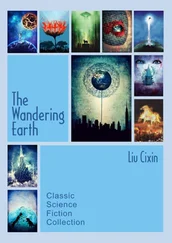Isaac Asimov - Gold - The Final Science Fiction Collection
Здесь есть возможность читать онлайн «Isaac Asimov - Gold - The Final Science Fiction Collection» весь текст электронной книги совершенно бесплатно (целиком полную версию без сокращений). В некоторых случаях можно слушать аудио, скачать через торрент в формате fb2 и присутствует краткое содержание. Год выпуска: 2003, ISBN: 2003, Издательство: Eos, Жанр: Фантастика и фэнтези, на английском языке. Описание произведения, (предисловие) а так же отзывы посетителей доступны на портале библиотеки ЛибКат.
- Название:Gold: The Final Science Fiction Collection
- Автор:
- Издательство:Eos
- Жанр:
- Год:2003
- ISBN:ISBN: 0-060-55652-8
- Рейтинг книги:3 / 5. Голосов: 1
-
Избранное:Добавить в избранное
- Отзывы:
-
Ваша оценка:
- 60
- 1
- 2
- 3
- 4
- 5
Gold: The Final Science Fiction Collection: краткое содержание, описание и аннотация
Предлагаем к чтению аннотацию, описание, краткое содержание или предисловие (зависит от того, что написал сам автор книги «Gold: The Final Science Fiction Collection»). Если вы не нашли необходимую информацию о книге — напишите в комментариях, мы постараемся отыскать её.
Gold: The Final Science Fiction Collection — читать онлайн бесплатно полную книгу (весь текст) целиком
Ниже представлен текст книги, разбитый по страницам. Система сохранения места последней прочитанной страницы, позволяет с удобством читать онлайн бесплатно книгу «Gold: The Final Science Fiction Collection», без необходимости каждый раз заново искать на чём Вы остановились. Поставьте закладку, и сможете в любой момент перейти на страницу, на которой закончили чтение.
Интервал:
Закладка:
Alexander said, peremptorily, “There is nothing new under the sun. Go through history and you’ll find that there are only changes in detail. I will conquer the world, but I am only one more conqueror in a long line stretching back to Sargon of Agade. The development of a high-tech society repeats certain advances in medieval China and in the ancient Hellenistic kingdoms. The Black Death was a repetition of the earlier plagues in the times of Marcus Aurelius and of Pericles. Even the devastation of the wars of nations in the twentieth century repeats the devastation of the wars of religion in the sixteenth and,seventeenth centuries. The differences in detail can be allowed for and, in any case, I order you to continue, and you must obey my orders.”
“I must,” agreed Bucephalus.
By the time Alexander was twenty-eight, he was the richest man who had ever lived, with assets that even Bucephalus could not estimate closely. Certainly it was over a hundred billion and his income was in the tens of millions a day.
No nation was any longer truly independent and nowhere could any sizable group of human beings take any action that would seriously discommode Alexander.
There was peace in the world because Alexander did not wish any of his property destroyed. There was firm order in the world because Alexander did not wish to be disturbed. For the same reason, there was no freedom. All must do exactly as Alexander willed.
“I am almost there, Bucephalus,” said Alexander. “In two more years, it will be completely beyond the power of any human being to discommode me. I will then reveal myself, and all of human science will be bent to one task, and one task only, that of making me immortal. I will no longer be even Alexander the Really Great. I will become Alexander the God and all human beings will worship me.”
Bucephalus said, “But I have gone as far as I can go. I may no longer be able to protect you from the viscissitudes of chance.”
“That can’t be so, Bucephalus,” said Alexander, impatiently. “Do not quail. Weigh all the variables and arrange to pour into my hands whatever of Earth’s wealth still exists outside it.”
“I don’t think I can, Alexander,” said Bucephalus. “I have discovered a factor in human history that I cannot weigh. It is something completely new that does not fit into any of the cycles.”
“There can be nothing new,” said Alexander, now in a fury. “Do not hang back. I order you to proceed.”
“Very well, then,” said Bucephalus, with a remarkably human sigh.
Alexander knew that Bucephalus was straining at this one last, greatest task, and he was confident that at any moment, it would be accomplished. The world would then be his entirely and through all eternity. “What is this something new?” he asked with a flicker of curiosity.
“Myself,” said Bucephalus, in a whisper. “Nothing like me has ever before exis-”
And before the last syllable could be expressed, Bucephalus went dark as every last chip and circuit within itself fused as a result of his mighty effort to encompass himself as part of history. In the economic and financial chaos that followed, Alexander was wiped out.
Earth regained its liberty-which meant, of course, that there was a certain amount of disorder here and there, but most people considered that a small price to pay.
In The Canyon
Dear Mabel,
Well, here we are, as promised. They’ve given us a permit to live in the Valles Marineris, and don’t think we haven’t been waiting for a year and a half because we have. They’re so slow and they keep talking about the capital investment required to make the place livable.
Valles Marineris sounds good as an address, but we just call it the Canyon, and I don’t know why they’re so worried about its being livable. It’s the Martian Riviera, if you ask me.
In the first place, it’s warmer down here than it is in the rest of Mars, a good ten degrees (Celsius) warmer. The air is thicker-thin enough, heaven knows-but thicker and a better protection against ultraviolet.
Of course, the main difficulty is getting in and out of the Canyon. It’s four miles deep in places and they’ve built roads here and there so that you can get down in special mobiles. Getting up and out is more difficult, but with gravity only two-fifths what it is on Earth, it isn’t as bad as it sounds, and they do say they’re going to build elevators that will take us at least partway up and down.
Another problem is, of course, that dust storms do tend to accumulate in the Canyon more than on the ordinary surface, and there are landslides now and then, but heavens, we don’t worry about that. We know where the faults are and where the landslides are likely to occur and no one digs in there.
That’s the thing, Mabel. After all, everyone on Mars lives under a dome or underground, but here in the Canyon, we can dig in sideways, which I understand is much preferable from an engineering standpoint, though I’ve asked Bill not to try to explain it to me.
For one thing, we can heat out some of the ice crystals, so that we don’t have to depend on the government for all the water we need. There is more ice down in the Canyon than elsewhere and, for another, it’s easier to manufacture the air, keep it inside the diggings, and circulate it when you’re in horizontally instead of down vertically. That’s what Bill says.
And I’ve been thinking about it, Mabel. Where’s the need to leave the Canyon, anyway? It’s over three thousand miles long and in the end there are going to be diggings all along it. It’s going to be a huge city, and I’ll bet you most of the population of Mars will end up here. Can’t you see it? There’s to be some kind of maglev rail running the length of the Canyon and communication will be easy. The government ought to put every bit of money it can into developing it. It will make Mars a great world.
Bill says (you know what he’s like-all enthusiasm) that the time will come when they will roof in the whole Canyon. Instead of having air just in separate diggings, and having to put on a spacesuit when you want to travel about, we will have a huge world of normal air and low gravity.
I said to him that the landslides might break the dome and we would lose all the air. He said that the dome could be built in separate sections and that any break would automatically shut off the affected areas. I asked him how much all that would cost. He said, “What’s the difference? It will be done little by little, over the centuries.”
Anyway, that’s his job here, now. He’s got his master’s license as an Areo-engineer, and he’s got to work out new ways to make the Canyon diggings even better. That’s why we got our new place here and it looks as though Mars is going to be our oyster.
We may not live to see it ourselves, but if our great-grandchildren make it to 2140, a century from now, we’ll have a world that may well overshadow Earth itself.
It would be wonderful. We’re very excited, Mabel.
Yours, Gladys.
Good-Bye To Earth
I am sending this message to Earth in an attempt to warn them about what I feel sure is going to happen, and what must happen. It is sad to think of what lies ahead, so no one wants to talk about it, but someone should, as the people of Earth ought to be prepared.
It is the latter half of the twenty-first century and there are a dozen Settlements in orbit about the Earth. Each is, in its way, an independent little world. The smallest has ten thousand inhabitants, the largest almost twenty-five thousand. I’m sure that all Earthmen know this, but you people are so entangled in your own giant world, that you rarely think of us except as some little inconsequential objects out in space. Well, think of us.
Читать дальшеИнтервал:
Закладка:
Похожие книги на «Gold: The Final Science Fiction Collection»
Представляем Вашему вниманию похожие книги на «Gold: The Final Science Fiction Collection» списком для выбора. Мы отобрали схожую по названию и смыслу литературу в надежде предоставить читателям больше вариантов отыскать новые, интересные, ещё непрочитанные произведения.
Обсуждение, отзывы о книге «Gold: The Final Science Fiction Collection» и просто собственные мнения читателей. Оставьте ваши комментарии, напишите, что Вы думаете о произведении, его смысле или главных героях. Укажите что конкретно понравилось, а что нет, и почему Вы так считаете.











